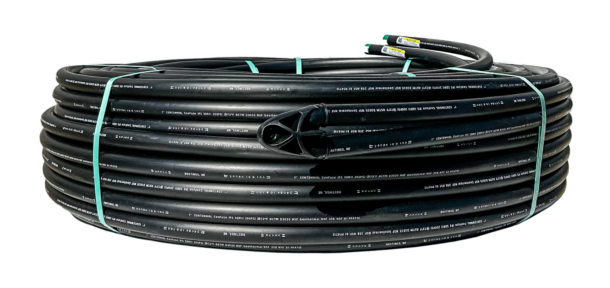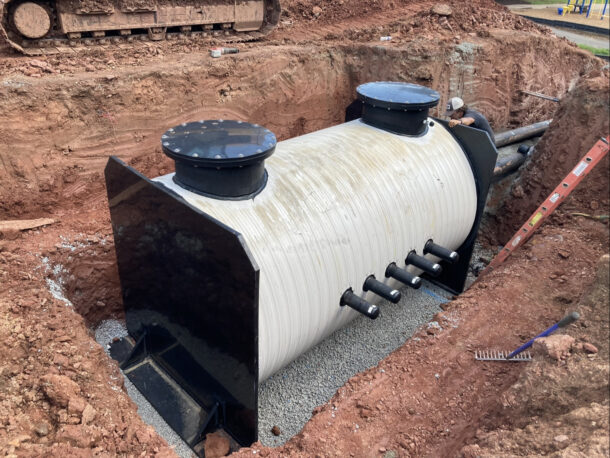Provides Guidance on Selecting and Installing The Plastics Pipe Institute’s Building & Construction Division has published a major revision of PPI TN-55 “Plastic Piping Materials for Ground Source Geothermal Heating and Cooling Applications”. Originally issued in 2018, the latest edition of TN-55 was published in August 2024 with the input of industry experts including PPI Read more
The Plastics Pipe Institute (PPI)

Provides Guidance on Selecting and Installing
The Plastics Pipe Institute’s Building & Construction Division has published a major revision of PPI TN-55 “Plastic Piping Materials for Ground Source Geothermal Heating and Cooling Applications”. Originally issued in 2018, the latest edition of TN-55 was published in August 2024 with the input of industry experts including PPI members and the International Ground Source Heat Pump Association (IGSHPA).
According to Lance MacNevin, P. Eng., director of engineering for PPI’s Building & Construction Division, “Because the piping material is critical to the overall success of the ground heat exchanger (GHX) in a geoexchange system, PPI TN-55 focuses on piping, fittings, and manifold materials. TN-55 lists the technical requirements for systems using HDPE, PEX, and PE-RT piping, plus requirements for PP pipes used as indoor piping, headers, and manifolds.”

A coil of PE4710 HDPE ground loop piping configured as a premanufactured U-bend assembly. Photo courtesy of Centennial Plastics.
The new technical note describes eight types of installation techniques, such as vertical boreholes, inclined or angled configurations, horizontal directional drilling (HDD), and energy piles, and discusses design topics, such as the effects of borehole depth on static water column pressure. It also addresses why oxygen diffusion barrier layers are typically not required for ground heat exchanger piping.
MacNevin continued, “The new TN-55 is intended to be a valuable resource on piping information, but this is just one of the latest tools available to specifiers and designers of geothermal heating and cooling systems. Details about pipe installation and pressure testing are found in PPI Model Specification MS-7, which published in 2023, and industry codes such as CSA/ANSI/IGSHPA C448 and the Uniform Mechanical Code.”
PPI is the non-profit North American trade association representing the plastic pipe industry, including several manufacturers of geothermal pipes, fittings, manifolds, and vaults. PPI formed its Geothermal Steering Committee in 2018 to develop industry publications, collaborate on codes, and create educational information about these systems.

A HDPE vault for connections of ground loop piping. Photo courtesy of PPI.
The revised PPI TN-55 is available directly from PPI at: www.plasticpipe.org/common/Uploaded files/Technical/TN-55.pdf
Additional information and data about ground source geothermal systems are available from the PPI Building & Construction Division at www.plasticpipe.org/buildingconstruction

The Plastics Pipe Institute, Inc. (PPI) today announced the appointment of Jason McKinnon, director of engineering services, Viega, LLC (Broomfield, CO), as the chair of its Education Committee. PPI is the major North American trade association representing the plastics pipe industry. “Our Education Committee,” stated David M. Fink, PPI president, “is counted on by the Read more
The Plastics Pipe Institute, Inc. (PPI) today announced the appointment of Jason McKinnon, director of engineering services, Viega, LLC (Broomfield, CO), as the chair of its Education Committee. PPI is the major North American trade association representing the plastics pipe industry.

“Our Education Committee,” stated David M. Fink, PPI president, “is counted on by the various industries we serve to provide viable, validated instruction on all aspects of plastic pipe. This includes courses and curriculum in each of our five divisions plus the Hydrostatic Stress Board. In his new role, Jason will assist in delivering courses at conferences with other organizations and use delivery platforms such as Red Vector and PPI’s own eLearn™ educational channel. His input on the new courses PPI will develop will be highly beneficial and valuable.”
McKinnon has more than twenty years of engineering and training experience developing new curriculum and training modules. He holds a Bachelor of Science – Mechanical Engineering Technology plus Master of Business Administration degrees from the University of Massachusetts. He has been a participating member of PPI for more than 10 years, mainly with the association’s Building & Construction Division, and was a founding member of the PPI Education Committee in 2013.
Founded in 1950, PPI’s five major divisions are Building & Construction, Drainage, Energy Piping Systems, Municipal & Industrial and Power & Communications. Its member companies share a common interest in broadening market opportunities that make effective use of plastics piping for building and construction projects, water and gas distribution, sewer and wastewater conveyance, oil and gas production, industrial and mining uses, plus power and communications systems. Additional information can be found at www.plasticpipe.org
